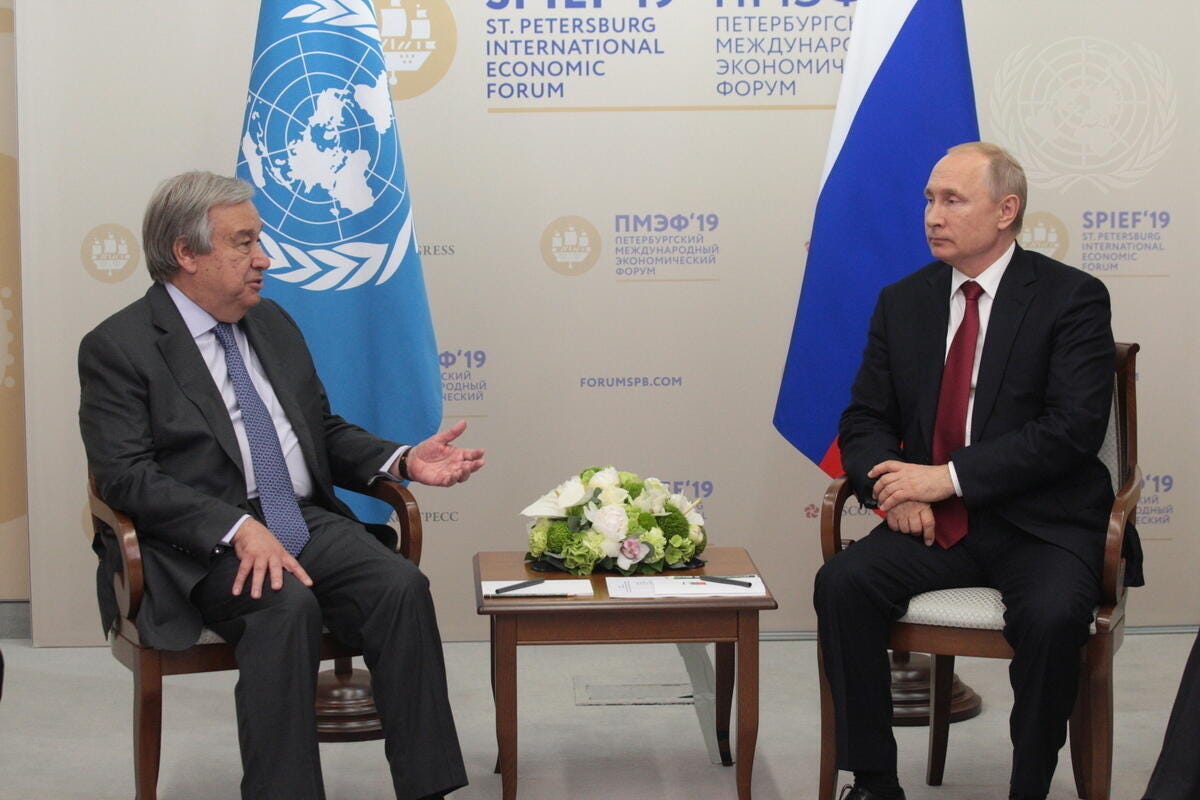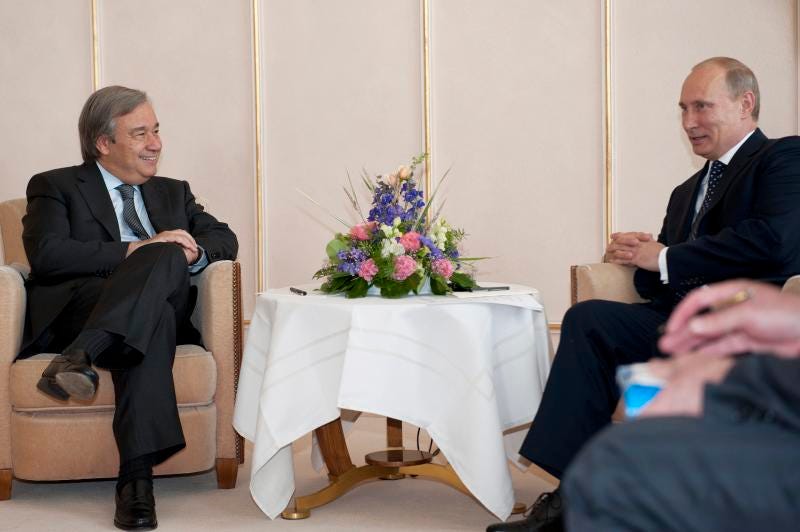UN Secretary-General Undermines the International Law He Is Supposed to Guarantee
Old-Fashioned Diplomacy Against Security and the Principles of the UN Charter
Secretary-General António Guterres meets with Vladimir Putin, President of the Russian Federation, at the Saint Petersburg International Economic Forum. June 7, 2019. UN Photo/Yury Kochkin
UN Secretary-General António Guterres’s meeting with Vladimir Putin on the sidelines of the BRICS summit in Kazan, Russia, on October 24, 2024, provoked widespread indignation and, at the very least, some consternation among democratic leaders, even if not all of them wished to publicly express their views on the matter. It adds to the discredit of the current Secretary General and casts a further shadow over an institution whose role is widely criticized.
We won’t go back over these elements of discomfort here, some of which depend on the organization itself, its leader and, more often than not, the nuisance capacity of Russia and China, permanent members of the Security Council, the former having acquired this position by deception, as I was keen to demonstrate. The major democratic nations are not completely innocent either.
Guterres’ agreement to meet Putin was his own initiative, and he alone is responsible for it. Given the circumstances, at a time when Russia is waging a war of extermination in Ukraine and committing massive war crimes, crimes against humanity and genocide, as well as a crime of aggression that makes all the others possible, the meeting raises specific questions of substance.
Disregard for international law and the UN Charter
First of all, is it admissible for the head of an organization that is supposed to defend international law to meet with the supposed president of a state that has been personally indicted for war crimes by the International Criminal Court and, as such, is legally a fugitive wanted by the 124 police forces of the member states of the Rome Statute? The answer is no, and reflects, to say the least, the lightness with which the UN Secretary-General views international law itself. He acts as if it either did not exist, or was of only relative and incidental importance. In so doing, he comes close to violating the UN Charter, and in particular its preamble, which sets out the objective of “establishing conditions under which justice and respect for the obligations arising from treaties and other sources of international law can be maintained”.
Secondly, by responding to an invitation from the BRICS, a peculiar organization whose clear orientation is to call into question the international order defined after Nuremberg and the creation of the UN, he is at least indirectly violating the principle of neutrality to which the Secretary General is bound by article 100 of the UN Charter, as well as the very foundation of the organization’s founding rules. What would have been said if he had attended a meeting of NATO, an alliance of democratic countries—even if Turkey is problematic in terms of compliance with the North Atlantic Charter, as are Hungary and Slovakia today—whose actions are based on the UN Charter? There would certainly have been widespread indignation from many countries, starting with the BRICS. Indeed, its presence could have been seen as a sign of a lack of neutrality, and would have been an unwelcome move.
Finally, as the Ukrainian authorities have pointed out, the feeling of double standards is accentuated by the fact that Guterres responded positively to the invitation of an outlawed aggressor country, and not to that of President Zelenskyy, to the first peace summit bringing together over eighty countries. Although the Secretary General condemned the Russian aggression, it cannot be said that he mentioned the Russian war against Ukraine as regularly as he did the conflict in the Middle East. I don’t recall him explicitly condemning Moscow’s crimes with no statute of limitation and simply calling, as his role required, for those responsible to be brought to justice.
These suspicions were already present at the meeting between António Guterres and Sergei Lavrov on January 23, 2024, which caused a certain amount of confusion. The Secretary-General’s simple gestures seemed to lend credence to the idea that he continued to regard Russia as a normal country, despite the immensity of the crimes committed. We also remember that, after Russia failed to comply with the first cereals agreement, Guterres continued to push for compromises and concessions from Ukraine that would have strengthened Russia. In the end, it was Ukraine alone that had the audacity, with the help of certain allies, to circumvent the Russian blockade, and it worked. In reality, it’s Guterres’s basic concept of “diplomacy” that needs to be called into question.
António Guterres then United Nations High Commissioner for Refugees with Vladimir Putin then Prime Minister of the Russian Federation, June 15, 2011. UN Photo/Jean-Marc Ferré
So-called diplomacy that plays into the enemy's hands
Without doubt, Guterres is not alone in having ingrained in himself an ultimately archaic conception of diplomacy, and in having failed to grasp the true nature of Russia's war against Ukraine and the world. This cannot be attributed either to his age (75) or to his overly long career (19 years) within the United Nations system, which can logically create certain biases in his thinking, and in particular a propensity to believe in negotiation at all costs. The main problem is threefold: ignorance of the perverse effects of this self-proclaimed diplomacy, unfamiliarity with the factors of legitimization in international relations, and a game that undermines the Allies’ efforts, however often inadequate, to support Ukraine.
Finally, the UN has shown that it can still play an effective, albeit limited, role in classic, relatively low-intensity conflicts, but that it has become—insofar as it ever was—ineffective in massive and, above all, total wars. Guterres has failed to internalize this reality, particularly in Russia’s precisely total and radically destructive war against Ukraine. Against all the evidence, he is still pretending to believe—something that the somewhat sensible leaders of the democracies have now, albeit too belatedly, given up on—that there could be an agreement or some form of negotiation with Moscow. It is as if an agreement were in itself to be sought, whatever its content and implications in terms of international law and collective security.
While he periodically reaffirms that peace must be just and based on the UN Charter and international law, and condemns the forcible annexation of territory, these words seem empty in the face of a diplomatic approach that has no chance of success. The cognitive dissonance of many international leaders is illustrated here. Wasting time, at best, talking to leaders whose raison d'être is mass murder contradicts the message of a solution that is totally in line with international law, which requires the liberation of all territories, the return of deported children, the punishment of criminals and the payment of war damages—the last three points never having been mentioned by the UN Secretary General. In so doing, Guterres is reinforcing a world of pretenses and illusions that delay and thwart determined action.
Secondly, as some national political leaders in the past and some still today—notably German Chancellor Olaf Scholz, who recently expressed his wish to talk to Putin, sparking outrage in his own country and beyond—seem to ignore the major role of legitimizing factors in international relations, particularly at a time when the propaganda of criminal regimes knows perfectly well how to advance their narratives. When these leaders meet someone like Putin or another dictator, not only can this constitute a breach of international law, it can also confer a form of legitimacy on state criminals. They know very well how to take advantage of this to publish reports or photographs that will confer on them a form of respectability or normalcy that is in total contradiction with their actions. A handshake, let alone a smile, or the sometimes involuntary expression of complicity, gives an advantage to the dictator and not to the leader of the state or international organization. I have already emphasized here the persistent ignorance of the basic rules of international communication.
Finally, this meeting between Guterres and Putin can only undermine not only President Zelenskyy’s efforts to secure a victory for Ukraine in accordance with international law, but also those of a number of other democratic leaders who are attempting, albeit in a particularly inadequate way, to establish an order less hostile to the rules of law and the principles of the UN Charter that revisionist powers such as Russia, China, Iran, North Korea and a few others want to overturn. It’s a form of parallel diplomacy that not only fails to produce results, but also runs counter to all other actions.
This meeting can only increase confusion. Worse still, it can only encourage the Russians to go even further in their offensive against Ukraine and other countries fighting for freedom. It will enable Moscow to play ever more profoundly on the distortion of facts and the reality of concepts and words, allowing it to present its war as just another point of view, accentuating the relativism that is one of its favorite weapons. Finally, it will help to conceal the total and exterminating nature of its war against Ukraine, and its intention to scuttle the principles of the international legal order from top to bottom. It will drive the final nail into the coffin of the UN.
In short, by acting in this way, António Guterres will undermine the organization of which he is the head, and render the principles of its Charter ineffective and derisory. We didn’t need such a disaster.





